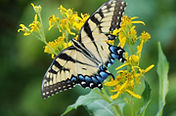house wren (Troglodytes aedon)
CONFIRMATION STATUS: Confirmed.
IDENTIFICATION:
-
Length: 4.25 inches
-
Short, thin bill
-
Indistinct supercilium
-
Eye ring
-
Gray-brown upperparts (browner in eastern United States birds)
-
Pale gray underparts with dark barring on belly and undertail coverts
-
Wings and tail barred with black
-
Tail frequently held upright
-
Pink legs
-
Sexes similar
Similar species:
Other wrens with indistinct superciliums are winter, sedge and rock
wrens. Winter wren is more reddish-brown above, darker below and
has a shorter tail. Sedge wren is buffier on the breast and is streaked
with white on the crown and back. Rock wren is larger with a contrast
between the gray back and brown rump and has buffy tips to the tail.
LIFE HISTORY
Migration Status: Neotropical migrant
Breeding Habitat: Successional-scrub
Nest Location: Mid-story/canopy nesting
Nest Type: Cavity
Clutch Size: 5-8
Length of Incubation: 13 days
Days to Fledge: 12-18
Number of Broods: 2, rarely 3
Diet: Primarily insects
SKY MEADOWS DISTRIBUTION/SEASONAL OCCURRENCE
Relative abundance and seasonal occurrence are indicated in red below.
Relative abundance
C - Common: Likely to be present in good numbers in appropriate habitat and season.
U - Uncommon: May be present in appropriate habitat and season, often in low
numbers.
O - Occassional: Found in appropriate habitat perhaps only a few times per season,
sometimes low numbers.
R - Rare: May not be recorded every year.
Acc - Accidental: Recorded once or twice, may not be expected again for a long time.
Seasonal Occurrence
Sp - Spring: March, April, May U
Su - Summer: June, July, August U
Fall: September, October, November U
Winter: December, January, February
Park Activities
Calendar of Events
Volunteer Programs
Sky Meadows Park
Location
Geography
Habitats
Trails
Visiting Park
Crooked Run Valley
Special Projects


